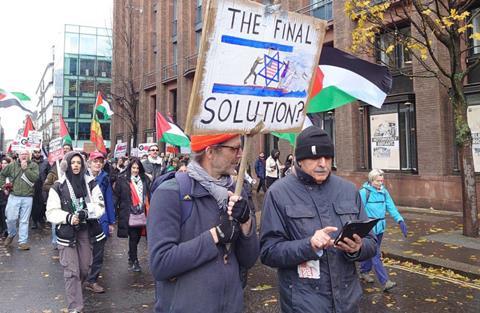If you don’t think that antisemitism has become magnified in recent weeks, then you’re definitely not Jewish, says Michael Coren

I was first aware of my Jewish heritage when I was 7 years old. I was at the home of a new friend I’d met in the local park. We were playing innocently when his father came home and began shouting. I only realised later what he’d been saying. “Is he a Jew? Get him out of here.”
I’m actually only half-Jewish, so perhaps I should have asked if I could at least stay until lunchtime…
In fact, I experienced very little antisemitism growing up in Britain and now living in Canada. I’ve three Jewish grandparents but my maternal grandmother was Anglican and I was raised with a limited Jewish identity.
Coren is a Hebrew name. People knew, and generally didn’t care.
I’d long considered hatred of Jewish people a pathology that while never dead, was confined to the largely irrelevant fringe. The reaction to Israel’s campaign in Gaza has changed that, however.
Of course there’s a vital difference between criticism of Israel and antisemitism, and of course the term is sometimes wrongly and politically applied, but if you don’t think that antisemitism has become magnified in recent weeks the one thing I can guarantee is that you’re not Jewish.
The basics first. I’ve lived in Israel, worked with Palestinian Christians in the peace movement, wrote my university thesis on pre-state Zionist terrorism, know the history and politics of the region rather well, and believe in a ceasefire, a two-state solution, justice for Palestinians, and peace for Israel.
TO CALL JESUS A PALESTINIAN IS RACIALLY AND POLITICALLY CRASS
I’d always assumed that most of my fellow Christians agreed with me on all this and I continue to believe that the vast majority still do.
But what of the Christian left?
I’ve a man of the left. Liberal, social democratic, an old-style Labour type of Christian. So, I was a little surprised to be blocked on Twitter by a cofounder of the Red-Letter Christians in the US and a prominent left-wing Christian. I’d objected to his reference to the “Holocaust hermeneutic”. I found it to be reductive and smug, especially as I’d grown up being aware of my great-aunt’s death camp tattoo.
I’m sure I’ll survive that social media excommunication but it’s indicative of a genuine problem. Gaza and the Palestinians have become a cause for the left, and that includes left-wing Christians. That’s entirely understandable and usually laudable, but for Christians there has to be a wider, deeper, more nuanced analysis.
One of, perhaps the main, motivation for Israel’s foundation in 1948 was the unparalleled agonies suffered by Jews in Christian Europe. Jews left the Arab, Muslim world later and weren’t the main protagonists in the early years. Centuries of pogroms, blood libels, expulsions, massacres, and finally the Holocaust took place in a continent that was overwhelmingly Christian. Good God, many of these atrocities were Church-initiated, and it’s only fairly recently that the wound of Christian antisemitism has begun to heal.
None of this should prevent a Christian from demanding justice and peace in Palestine, but it should inform our approach, understanding, and sympathies.
I also see a shameful lack of empathy in the depiction and description of Jesus as a Palestinian. I appreciate what is being attempted, but we should never forget the horrors that have been caused by the expunging of the Jewishness of Jesus and his family and early followers. He was a Jew, a Galilean Jew, with a Jewish mother. To suggest otherwise is not only bad theology and a denial of God’s plan but also racially and politically crass and dangerous.
I sometimes hear and read things from Christians that border on the racist, and make it appear that the entire Israel/Palestine conflict exists in a bubble without any historical and human context. “Colonial settlers,” they say. Where were the survivors of the Shoah and later the Mizrahi Jews supposed to go, and why does my paternal DNA go back not to Europe but the Middle East?
No authentic follower of Jesus can turn away from the slaughter of the innocents. But our commitment is not to a political ideology but to a relationship with God, and such a relationship rests on love for all people, understanding of our own brokenness and failings, and to a great, grand revolution of compassion and understanding. The Jewish Jesus teaches me that, and should teach us all. PC.
.jpeg)